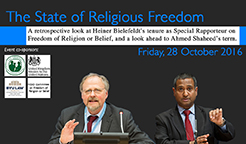UN Side Event: The State of Religious Freedom

In an event that took place at the United Nations in New York City on 28 October 2016, Professor Heiner Bielefeldt provided a thoughtful retrospective look at his six-year tenure as UN Special Rapporteur on Freedom of Religion or Belief. Professor Bielefeldt was to be joined by Dr. Ahmed Shaheed, set to replace Professor Bielefeldt in office on November 1, but laryngitis prevented Mr. Shaheed from joining him.
Stephen Hickey, Political Counsellor at the UK Mission to the United Nations in New York welcomed the group and made brief remarks on freedom of religion and belief. David Colton, representative in New York for LDS Charities, acted as the moderator of the event. Professor Bielefeldt’s speech was followed by a lively Question and Answer session.
The event was co-sponsored by the International Center for Law and Religion Studies, the United Kingdom Mission to the United Nations, Latter-day Saint Charities, and the NGO Committee on Freedom of Religion or Belief.
The event was set to coincide with the delivery to the UN General Assembly of the Special Rapporteur’s annual *interim report on freedom of religion or belief. Dr. Shaheed, who has been since June 2011 the UN Special Rapporteur on the situation of human rights in the Islamic Republic of Iran, gave his final **report in that position to the General Assembly on 30 September 2016.
*Interim report of the Special Rapporteur on freedom of religion or belief, summary:
In the present report, the Special Rapporteur on freedom of religion or belief, Heiner Bielefeldt, provides an overview of his mandated activities since the submission of his previous report to the General Assembly (A/70/286).
Thematically, the focus of the report is on the broad range of violations of freedom of religion or belief and their manifold root causes, as well as additional variables, including from a gender perspective, which need to be taken into account for an appropriate analysis of the problems. The aim of the report is to sensitize readers to the broad range of violations, many of which do not attract adequate, if any, public attention. Governments are obliged to take effective measures to prevent violations of freedom of religion or belief, including abuses committed by non-State actors. At the outset, the Special Rapporteur defines the scope and contours of the right to freedom of thought, conscience, religion or belief, which must be broadly construed in keeping with the universalistic spirit of human rights.
The Special Rapporteur submits the present report, his sixth to the General Assembly, pursuant to Human Rights Council resolution 31/19. In his report the Special Rapporteur primarily presents information gathered from government sources and relayed by alleged victims of rights violations as well as civil society actors located inside and outside the country.